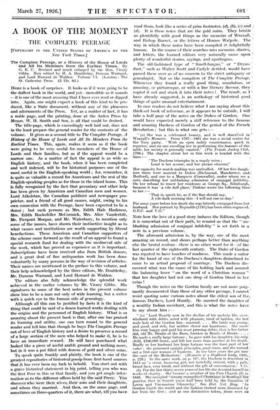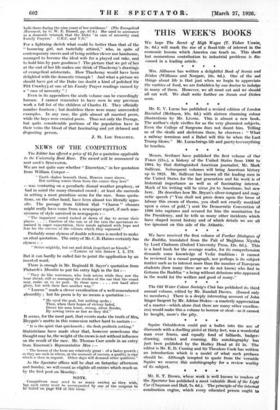A BOOK OF THE MOMENT
THE COMPLETE PEERAGE
[COPi'RIGHT IN THE UNIT'ED STATES OF AMERICA BY THE
'em York Times.]
The Complete Peerage, or a History of the House of Lords ' and All Its Members from the Earliest Times. By 0: E. C. Revised and much enlarged by the Hon. Vicary Gibbs. Now edited by H. A. Doubleday, Duncan Warrand, -
HERE is a book of surprises. It looks as if it were going to be the dullest book in the world, and yet—incredible as it sounds —it is one of the most amusing that I have ever read or dipped into. Again, one might expect a book of this kind to be pro-
duced, like a State -document, without any of the pleasures and adornments of the Press. Yet, as a matter of fact, it has a noble page, and the printing, done at the Arden Press by Messrs. W. H. Smith and Son, is all that could be desired. The title-page, which is exceedingly well laid out, does not in the least prepare the general reader for the contents of the volume. It gives as a second title to The Complete Peerage, A History of the House of Lords and All Its Members Prom the Earliest Times. This, again, makes it seem as if the book were going to be very useful for smembers of the House of Lords and their families, but as if the appeal would be a narrow one. As a matter of fact the appeal is as wide as English history, and the book, when it has been completed and well indexed, will be for historical purposes one of the most: useful in the English-speaking world ; for, remember, it is quite as valuable a record for Americans and the rest of the
English-speaking peoples as for those in the island home. This is fully recognized by the fact that pecuniary and other help
has been given by American and Canadian men and women. Lord Athoistan, the Canadian publicist and newspaper pro- prietor, and a friend of all good causes, might, owing to his own connexion with the Peerage, have been expected to be a
donor ; but such persons as Mrs. Edith Hale Harkness, Mrs. *Edith Rockefeller McCormick, Mrs. Alice Vanderbilt, Mr. Pierpont Morgan, and Mr. Waterbury, to mention only some of the names, have shown their instinctive insight as to -what causes and institutions are worth supporting by liberal
benefactions. These American and Canadian supporters, of the scheme came forward as the result of an appeal to found a
special research fund for dealing with the mediaeval side of the work, -which has proved as expensive as it is important. Subscriptions have been received also from British donors, and a great deal of fine antiquarian work has been done voluntarily by many persons'in the way of revision of articles. Their names are mentioned in the preface to this volume, and
their help acknowledged by the three editors, Mr. Doubleday, ' Mr. Duncan Warrand, and Lord Howard de Walden.
The editors also fully acknowledge the splendid work achieved in the earlier volumes by Mr. Vicary Gibbs. His signatures to some of the best notes in the present volume shosi him to be a man not only of wide learning, but a writer with 'a quick eye to the human side of genealogy.
Although all this can be justified by facts it is the kind of thing that could be said of a dozen learned works dealing with the origins and the personnel of English history. What is so amazing about the present book is that, after one has praised its learning and utility, one can turn round to the general reader and tell him that though he buys The Complete Peerage out of love of English history and a desire to preserve a record
of a large section of .the men who helped to• make it, he is to have an immediate reward. He will have purchased what looked like a piece of useful arable ground and nothing more, but in it was a pot filled with dozens of gold and silver coins. To. speak quite frankly and plainly, the book is one of the greatest repositories of historical gossip from first-hand sources
that it has ever been my luck to behold. You start out with . a grave historical statement in big print, telling you who was the first Peer in this or that family, and you get ample infor-
mation as-to thedifferent-offices held by the-said-Peers: 'You
.• discover who were their wives, their sons and their daughters, and whom they married. And then, on the same page, and sometimes on three-quarters of it, there are what, till you have
read them, look like a series of prim footnotes, 04, (b),- (e) and (d). It is these notes that are the gold coins. They bristle as plentifully with good things as the memoirs of Wraxall, and Bishop Burnet, or the letters of Horace Walpole. The way in which these notes have been compiled is delightfully human. In the course of their searches into memoirs, diaries, and letters, the learned editors very naturally came upon plenty of wonderful stories, sayings, and apothegms.
The old-fashioned type of " Smell-fungus," or " Dryas- dust," such as Walter Scott and Carlyle derided, would have passed these over as of no concern to the strict antiquary or genealogist. Not so the compilers of The Complete Peerage. Whenever they found a really good thing, scandalous, or amusing, or picturesque, or with a fine literary flavour, they copied it out and stuck it into their notes ! The result, as I have already suggested, is an anthology of historical good things of quite unusual entertainment.
In case readers do not believe what I am saying about this thick-set book of reference, as it appears to be outside, I will ; take a half page of the notes on the Dukes of Gordon. One ' would have expected merely a stiff reference to the famous and amazing Duchess of Gordon of the period of the French ' Revolution ; but this is what one gets :—
" (a) She was a celebrated beauty. and is well described in Wraxall's Memoirs. From 1787-1801 she was a social centre for the Tory party. With an open ruddy countenance, quick in ' repartee, and no one excelling her in performing the honours of the table, her society is generally courted. (The Female Jockey Club, 1794.) The chapter about her in this work is headed with the lines :— The Duchess triumphs in a manly mien ; • Loud is her accent, and her phrase obscene.
Her capacity for match-making was unrivalled. Of her five daugh- ters three were married to Dukes (Richmond, Manchester, and 1 Bedford), and one to a Marquess (Cornwallis), under whom see a note describing her unblushing admission of conjugal infidelity. , On her refusal to renew her residence at George Sq., Edinburgh, - because it was ' a vile dull place,' Erskine wrote the following lines- to her:—
'That is, quoth he, as if the Sun should say, A vile dark morning this—I will not rise to-day.' For some years before her death she was bitterly estranged from her husband. Her portrait by Reynolds (1785) has been often engraved. ' G.E.C. and V.G."
Note, how the love of a good story induces the Editors, though ' it is somewhat out of their path, to remind us that the " un- blushing admission of conjugal infidelity " is set forth in a
note in a previous volume. • - The aforesaid admission is, by the way, one of the most amazing on record, and shows perhaps better than anything"' else the brutal realism—there is no other word for it—of the last quarter of the eighteenth century. The Duke of Gordon was reputed to have touches of madness. This made a suitor for the hand of one of the Duchess's daughters disinclined to come to an actual proposal of marriage. The Duchess dis- - covered what was the cause of his holding back and assured, the balancing lover " on the word of a Christian woman " - that her daughter had not one drop of Gordon blood in her veins Though the notes on the Gordon family are not more poig- nantly
documented than those of any other peerage, I cannot resist quoting some curious notes about the eldest son of the; famous Duchess, Lord Huntly. He married the daughter of a wealthy Indian merchant, and this is what the notes have to say about him :— " (a) ' Lord Huntly now in the decline of his rackety life, over- whelmed with debts, sated with pleasure, tired of fashion, the last; male heir of the Gordon line—married. . . . His bride was young,: and good, and rich, but neither clever nor handsome. She made him very happy and paid his most pressing debts, that is her father did, old Mr. Brodie of the Burn, brother to Brodie of Brodie.. . He made a really large fortune ; ho gave with his daughter, his only child, £100,000 down, and left her more than another at his death.' Really to her husband her large fortune was the least part of her' value ; she possessed upright principles, good sense, and she turned opt a first-rate woman of business. In her later years she got into the cant of the Methodists.' (Memoirs of a Highland Lady, l898,,, p. 229.) In the same work, on p. 242, tho Duchess is described in,, 1814 as a stout, bouncing girl, not tastefully attired, with a pale,';. broad face, very timid, and without the gift of conversation.' V.G. (b) For the last thirty-seven years of her life she devoted herself to works of charity. She became a member of the Free Church (5) in 1846. She-eccirriied--"-aineng evingelieel Christiana ;£40641atid tire-' position that th form-er 'year* had-been hold by the Conn-foss of Leven and Viscountess Glenorchy.' See Did. Nat. Biog. In Gordon Castle the world and the fashion thereof were disowned by her from the first ; and as one distinctive token, there were no balls there during the nine years of her residence.' (The Evangelical Movement, by G. W. E. Russell, pp. 67-8.) She used to announce as a domestic triumph that the Duke in case of necessity read
Family Prayers.' G.E.C. and V.G." • •
For a lightning sketch what could be better than that of the " bouncing girl, not tastefully attired," who, in spite ,of contemporary sneers and of being neither clever nor handsome, managed to become the ideal wife for a played out rake, and to hold him by pure goodness? The picture that we get of her at the end of her life makes one think of Thackeray's draVrinia of evangelical aristocrats. How Thackeray would have been delighted with the domestic triumph ! And what a picture we should have got of the Duke (no doubt a kind of polished Sir Pitt Crawleyi_at one of his Family Prayer readings caused by a " case of necessity " !
Even in its appendices the sixth volume can be exceedingly human. I cannot remember to have seen in any previous work a full list of the children of Charles II. They officially number fourteen ; but doubtless there were many unrecorded examples. In any case, the girls almost all married peers, while the boys were created peers. Thus not only the Peerage, but quite considerable portions of the population have in their veins the blood of that fascinating and yet debased and disgusting person.
J. St. LOE STRACHEY.























































 Previous page
Previous page